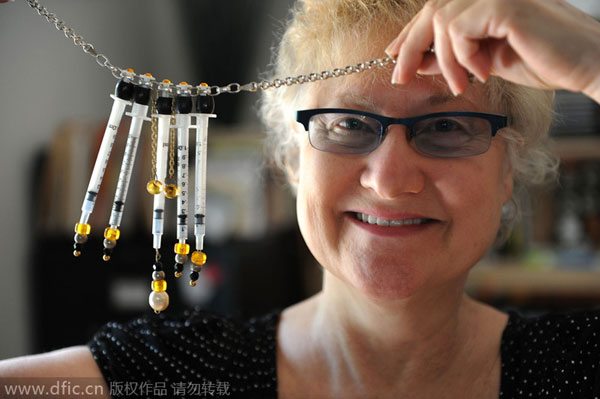Two-thirds of cancer cases due to "bad luck": Study
The majority of cancer cases can be explained by "bad luck" rather than the result of environmental factors and inherited genes, a U.S. study said Thursday.
The study, published in the U.S. journal Science, found that two-thirds of adult cancer incidence across tissues might be caused by random mutations that occur in dividing healthy stem cells.
The findings, based on a statistical model that quantified how much of three factors -- bad luck, the environment and heredity -- contribute to cancer development, might help researchers design more effective prevention strategies for different cancer types.
"Changing our lifestyle and habits will be a huge help in preventing certain cancers, but this may not be as effective for a variety of others," said coauthor Cristian Tomasetti, assistant professor of oncology at the Johns Hopkins University School of Medicine and Bloomberg School of Public Health. "We should focus more resources on finding ways to detect such cancers at early, curable stages."
It was well-known that cancer arises when tissue-specific stem cells make random mistakes, or mutations, when one chemical letter in DNA is incorrectly swapped for another during the replication process in cell division.
The more these mutations accumulate, the higher the risk that cells will grow unchecked, a hallmark of cancer.
The actual contribution of these random mistakes to cancer incidence, in comparison to the contribution of hereditary or environmental factors, was not previously known.
In the new study, researchers analyzed published data on stem cell divisions in 31 different human tissues and compared the data to the lifetime incidence of cancer in those tissues.
They determined the correlation between the total number of stem cell divisions and cancer risk to be 0.804.
"Our study shows, in general, that a change in the number of stem cell divisions in a tissue type is highly correlated with a change in the incidence of cancer in that same tissue," said coauthor Bert Vogelstein, professor of oncology at the Johns Hopkins University School of Medicine.
One example, he said, is in colon tissue, which undergoes four times more stem cell divisions than small intestine tissue in humans. Likewise, colon cancer is much more prevalent than small intestinal cancer.
Mice, by contrast, have a lower number of stem cell divisions in their colons than in their small intestines. Similarly, cancer incidence in mice is lower in the colon than in the small intestine.
Using statistical theory, the pair calculated how much of the variation in cancer risk can be explained by the number of stem cell divisions, which is 0.804 squared, or, in percentage form, about 65 percent.
Further research found that 22 cancer types in 31 tissues could be largely explained by the "bad luck" factor of random DNA mutations during cell division.
The other nine cancer types had incidences higher than predicted by "bad luck" and were presumably due to a combination of bad luck plus environmental or inherited factors, they said.
"We found that the types of cancer that had higher risk than predicted by the number of stem cell divisions were precisely the ones you'd expect, including lung cancer, which is linked to smoking; skin cancer, linked to sun exposure; and forms of cancers associated with hereditary syndromes," said Vogelstein.
He claimed that cancer-free longevity in people exposed to cancer-causing agents, such as tobacco, may not be due to their " good genes."
"The truth is that most of them simply had good luck," said Vogelstein, cautioning that poor lifestyles can add to the bad luck factor in the development of cancer.
"However, many forms of cancer are due largely to the bad luck of acquiring a mutation in a cancer driver gene regardless of lifestyle and heredity factors," he said. "The best way to eradicate these cancers will be through early detection, when they are still curable by surgery."
The researchers noted that some cancers, such as breast and prostate cancer, were not included in the study because of their inability to find reliable stem cell division rates in the scientific literature.























